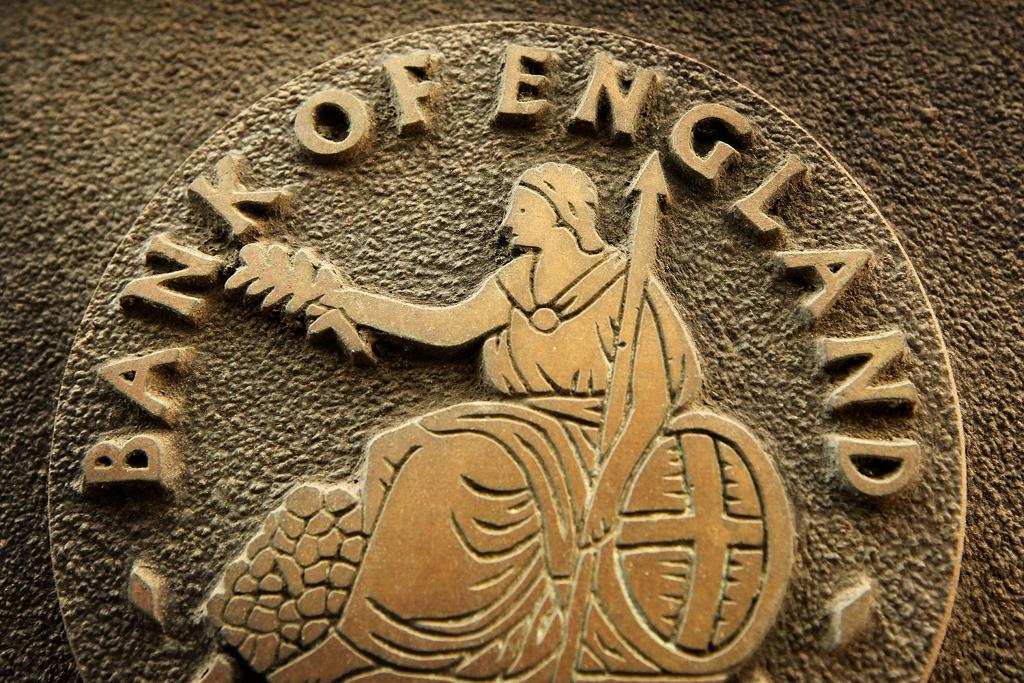Inflation is coming, Bank of England warns
A Bank of England sign is displayed outside The Bank on Jan. 8, 2009 in London, England.
Inflation in the UK will remain above target for the next two years, Bank of England Governor Mervyn King warned on Wednesday, but tightening monetary policy was not the solution as it could push the economy deeper into recession.
Sterling fell to a six-month low against the dollar as Mervyn King spoke at a press conference following an inflation report released by the central bank. Against the euro, sterling has tumbled nearly 6 percent so far this year and King said the uptick in inflation will reflect this recent depreciation.
Inflation has remained stubbornly above the 2 percent target, and was unchanged in January at 2.7 percent. It is likely to rise further in the near term and may remain above the 2 percent target for the next two years, the report said.
The average earnings of UK workers have been falling in real terms for the last three years, the Office for National Statistics said earlier on Wednesday, and have slumped to a similar level to a decade ago.
"We do need to get back to normal interest rates, but if we were to try to get back today or this year, we would simply turn the economy into a deeper recession. And trying to reconcile those two positions is the challenge of the paradox of policy and it's proving exceptionally difficult and I don't have an easy answer to it," King said.
He said any further expansion of monetary policy was like "running up an ever steeper hill" and added that there was a limit for any monetary policy to go on stimulating private demand.
(Read More: Bank of England Holds Policy, Will Reinvest Maturing Bonds)
The report said that inflation was expected to fall back to around the target after two years, as a gradual revival in productivity growth dampens increases in domestic costs and external price pressures fade.
There are growing fears among some investors that central banks in the developed world aren't acting to stem rising inflation. They fear it may be too late to tighten monetary policy.
Others fear a repeat of 1994, when bond yields surged and bonds sold off after the Federal Reserve raised rates over the spring and summer of that year.
(Read More: Carney Sets High Bar to Bank of England Changes)
But King said the situation today was very different from the mid 1990s.
He said the 1990s were marked by temporary demand or supply shocks, which caused inflation to rise or fall.
"In this case, it is not a temporary deviation from long-term growth," he said. "This hasn't been a normal recession and this won't be a normal recovery."
King defended inflation targeting, despite recent calls to scrap it, and said the inflation target helped anchor expectations about rising prices.
(Read More: QE Program a 'Disaster,' Say UK Saving and Pension Groups)
King warned that if the bank saw wage increases and inflation expectations rising over the medium term it would react appropriately.
"The Bank remains between a rock and a hard place in trying to strike a balance between the rising pressures of inflation and supporting the economic recovery," Joshua Raymond, chief market strategist at City Index, said in a note.
"Clearly right now the Bank is firmly weighting its actions to the latter at the expense of inflation but the question is how long can this last? The upward revisions to inflation merely over the past six months are alarming especially when put alongside anemic wage growth. The Bank is now facing time pressures from waiting for output – and indeed supply side reforms – to increase to a level that may allow it to act on curbing inflation."
The Bank of England seems to be more explicitly adopting a flexible inflation target, according to Howard Archer, chief economist at IHS Global Insight. Incoming Bank of England governor Mark Carney has previously said a flexible inflation target is the best approach for central banks.
"Unless the news on the economy is really dire over the coming weeks, we suspect that the MPC (Monetary Policy Committee) will prefer to hold fire on any more QE (quantitative easing) until at least well into the second quarter given that consumer price inflation is set to hit 3 percent in the near term," Archer said in a note.
"With economic activity likely to remain fragile and limited, we believe that the Bank of England will eventually decide to give the economy a further helping hand with another 50 billion [pounds] ($78 billion) of QE, taking the stock up to 425 billion [pounds]."
More from our partner, CNBC:
CNBC: Stocks Waver; Dow Inches Near All-Time High
CNBC: European Shares Extend Gains, FTSE at 5-Year Peak
CNBC: Why the Dollar Rebound Won't Last
